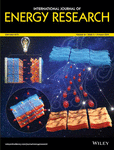Lithium-ion battery state-of-charge estimation of an order-reduced physics-based model in electric vehicles considering erroneous initialization
Funding information: Natural Science Foundation of Chongqing; Scientific Research Foundation of Chongqing University of Technology, Grant/Award Number: 2021ZDZ004; Department of Science and Technology of Henan Province, Grant/Award Number: 212102210008; Natural Science Foundation of Chongqing, China, Scientific Research Foundation of Chongqing University of Technology, Grant/Award Number: 2021ZDZ004
Summary
Intelligent battery management systems (BMSs) require immediate and precise state of charge (SoC) estimation of the lithium-ion cell for efficient use in electric vehicles (EVs). To solve the problem of real-time SoC estimation for physics-based lithium-ion cell models in BMSs, rigorous physics-based models are required to be reasonably order-reduced. In this paper, an improved order-reduced physics-based model is proposed and validated with experimental data. Next, state equations of the reduced model are established by adopting finite difference approaches. Moreover, three reduced model-based estimators including the extended Kalman filter (EKF), the uniform reaching law sliding-mode observer (SMO-URL), and the exponential reaching law sliding-mode observer (SMO-ERL) are developed to estimate battery SoC by using input current and external measured voltage. To demonstrate the effectiveness of the proposed SoC estimation algorithms, their performances are evaluated and compared via experimentation under the hybrid pulse power characteristic (HPPC) test. The results show that the proposed order-reduced model-based SMO-ERL algorithm has faster convergence ability and higher estimation accuracy compared with the other two algorithms under incorrect SoC initial conditions.
CONFLICT OF INTEREST
The authors declare no conflict of interest.




